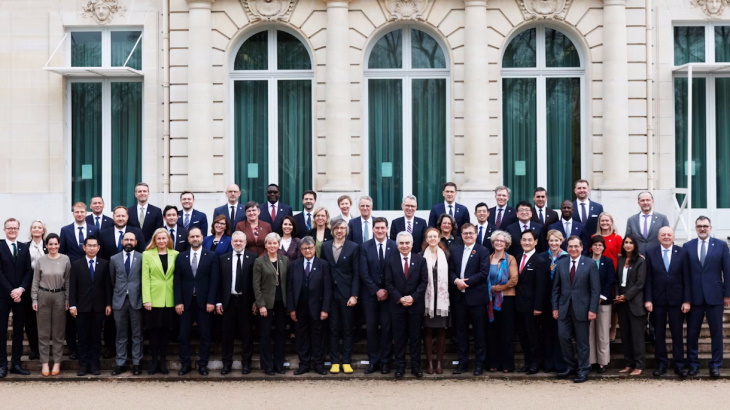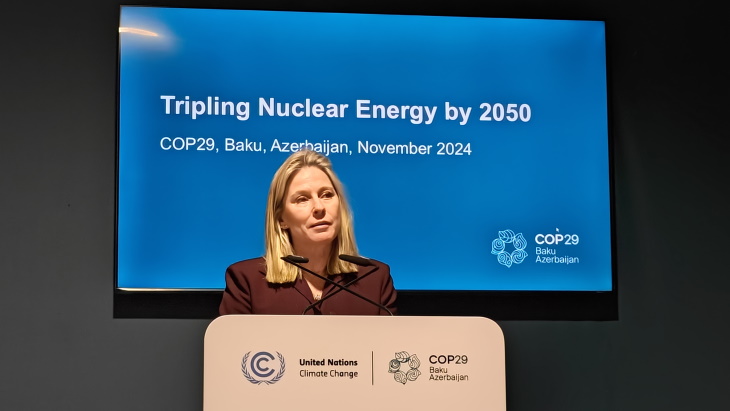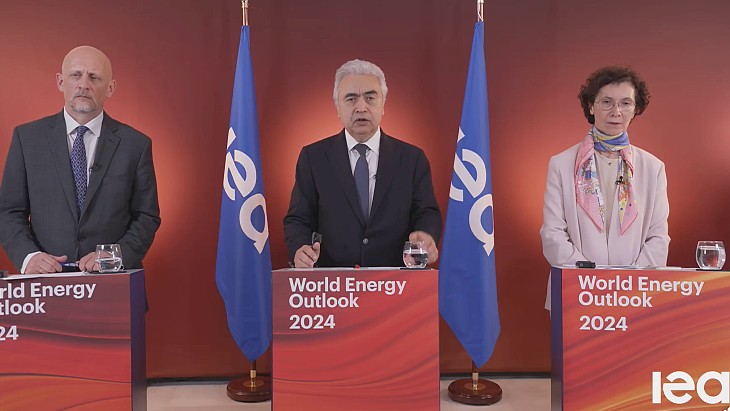IEA Ministerial Meeting recognises role of nuclear

The IEA said the event - co-chaired by France and Ireland - "produced a strong commitment to safeguard energy security while speeding up clean energy transitions to keep the goal of limiting global warming to 1.5°C within reach".
"Those countries that opt to use nuclear energy or support its use recognise its potential as a clean energy source that can reduce dependence on fossil fuels, to address the climate crisis and improve global energy security," a ministerial communiqué released at the end of the event said. "These countries recognise nuclear energy as a source of baseload power, providing grid stability and flexibility, and optimising use of grid capacity, while other countries choose other options to achieve the same goals. We recognise the importance of ensuring the highest standards of nuclear safety, security and non-proliferation."
Speaking at the closing press conference, IEA Executive Director Fatih Birol noted: "For the first time, there was a full paragraph in the recognition of nuclear power to address energy security and climate change issues."
"In our communique it is clear that it is up to countries to pick nuclear or not - it is optional. There is no push for countries to make use of nuclear, but if countries opt to use nuclear power we have highlighted the benefits of that. It is up to countries to make their own strategies."
Irish Minister for Environment, Climate and Communications Eamon Ryan, who co-chaired the meeting, added: "The text we have agreed today may obviously contain paragraphs that some countries feel uncomfortable with, but that doesn't mean you can't agree the overall.
"And it's really critical that we did come together at a time when multilateralism is at risk in so many different areas, that we are agreed in the clear, broad direction that we are going and it's not forcing any one country in terms of its fuel choices but it is absolutely saying that we are all having to decarbonise."
"I have been speaking with French industrials, European industrials and global industrials over the past 24 months, and I asked them 'What do you need to make sure you are on track and that we get rid of emissions by 2050?'," said Roland Lescure, France's Minister for Industry and Energy, who also co-chaired the meeting. "They say one thing - we need low-carbon energy like there is no tomorrow and we need it cheap.
"And I think they all had their own views on getting there. But it's about time we just get there. So some countries will get there one way. We know that Germany, for example, is going full-on with renewables. We (France) have decided to go 50/50 - we are going to have nuclear and renewables. The most important thing is to just do it. Let's do it together ... the time for ideological wars is over. Now is the time for action. What we are showing today, it's the first ministerial meeting after the COP that we are ready to act."
COP28 - held in Dubai in late 2023 - ended with a unanimous agreement by all parties calling for a transitioning away from fossil fuels and an acceleration of zero- and low-emission technologies, including nuclear. The text of the agreement said that the parties recognise that limiting global warming to 1.5°C "with no or limited overshoot requires deep, rapid and sustained reductions in global greenhouse gas emissions of 43% by 2030 and 60% by 2035 relative to the 2019 level and reaching net-zero carbon dioxide emissions by 2050".
World Nuclear Association Director General Sama Bilbao y León spoke during the closing session of the event's Energy Innovation Forum. She said: "To some extent, the IEA has included the role of nuclear energy in global decarbonisation for some years. But I think that certainly after COP28, where for the first time we actually saw nuclear energy recognised as one of the energy technologies that need to be accelerated if we are serious about meeting Paris Agreement goals and we had over 25 countries committing to trebling nuclear capacity by 2050, I encourage the IEA to consider nuclear energy with more ambition in future analyses.
She added: "We see that sometimes the challenges that we have is not the technology, it is the delivery model of this technology. Certainly that is true for nuclear energy and also we really need to have - and here I think it would be fantastic for the IEA to look into - industrial policy. We heard this in a couple of sessions before and I would like to emphasise that I think it is important to have good energy policy. But industrial policy goes right behind it because not every startup, not every sector, can develop their own supply chain, their own industrial infrastructure in order to succeed, to develop what we need at scale at speed."

_99697.jpg)








_88592.jpg)

